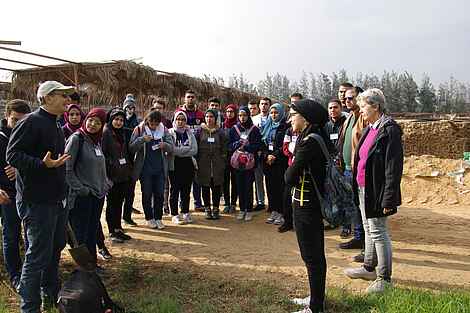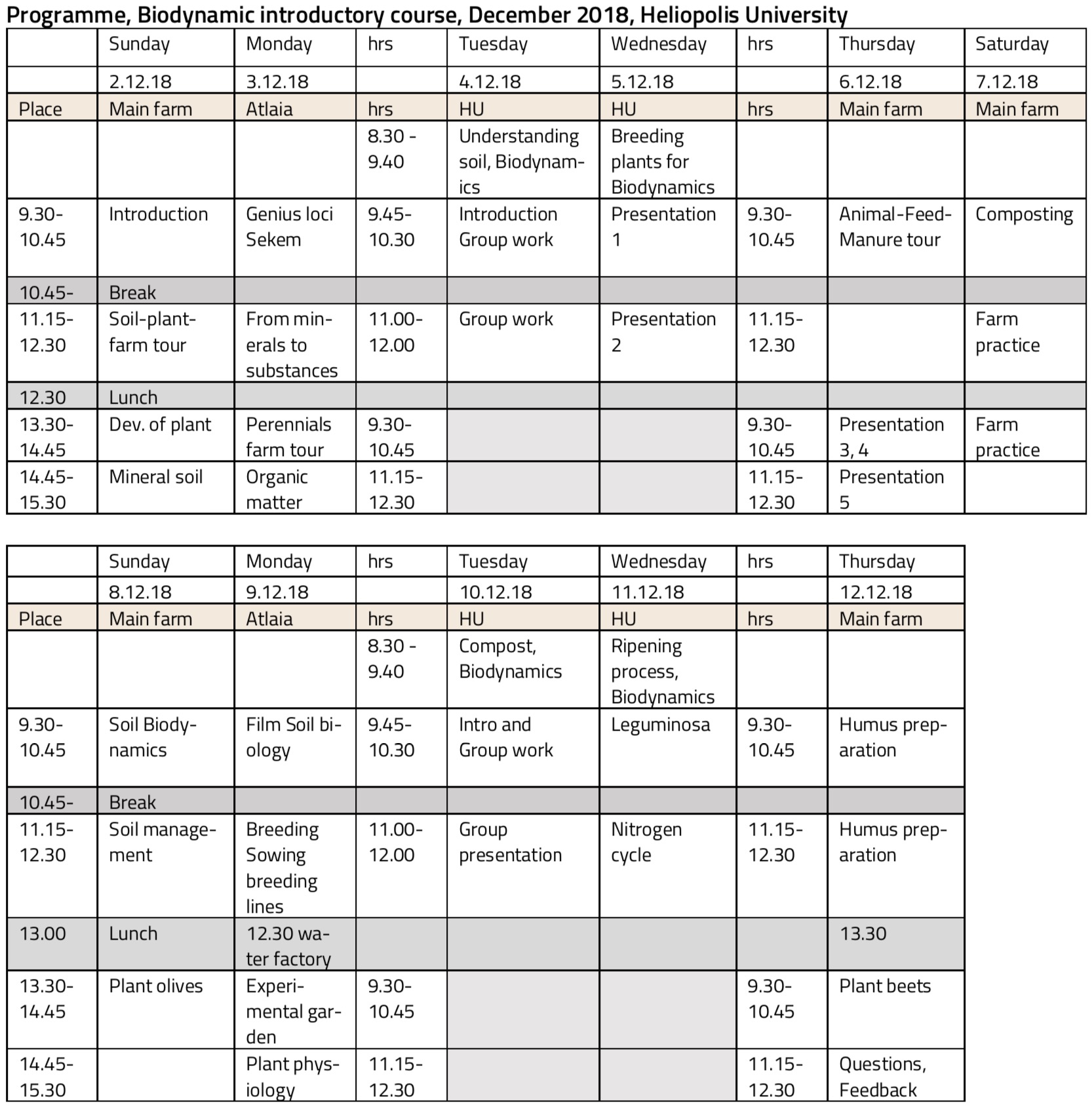Report for Heliopolis University and the Section at the Goetheanum
Working conditions
The course was supported throughout by Prof. Dr. Yousri Hashem (President of Heliopolis University for Sustainable Development ) and Angela Hofmann (Director of the SEKEM farm). Thanks to the enthusiastic help of the team of farm department leaders it was possible to hold most of the course on the main Sekem farm. Students travelled regularly from Heliopolis University to Belbeis by bus. Seven working days were spent completely and without interruption with the subject, four days were spent on the campus of Heliopolis University.
It was a fruitful interdisciplinary collaboration between international experts, university and farm leaders and local staff to create a space were a holistic teaching approach was put into practice without disturbance from the ordinary schedule and routines of the University.
We were very grateful for this preliminary preparation.
Programme
The programme covered the first steps, focussing on the soil-plant-farm unity as a fundamental unit for sustainable farming operations worldwide:
- Conditions of soil creation and agricultural care for the soil
- Plant development diversity and options for integration in agricultural production
- Synergies in farm units with ruminants
Teaching methods
The main goal of the course was to bring the theoretical knowledge from the first semester into a relationship with agricultural practice.
Besides short introductory and descriptive contributions, the students were introduced to “Goethanistic” observation of soil, plant and farm phenomena.
The results were shared and discussed continuously and brought together in deepening exchanges.
We made sure that we started at the students’ level, given their diverse knowledge and language skills.
Results
- English as the course language is a big challenge and at times too great a barrier for quick assimilation of knowledge.
- The students’ level of agricultural knowledge is really basic. Egyptian agronomy students are usually not at all familiar with farm life and farm practices, even more so than in other educational systems. The experts have to take this into account when teaching. There is no common agricultural base on which to build organic practices. All the steps have to be explained!
- It was possible to reach the students and to interest them in the secrets of the soil and the universal power of plants.
The majority started to connect natural science knowledge and (agri-)cultural experience in one picture. They opened themselves to learn more, to ask questions themselves and to learn how to deduce consequences for a sustainable approach. - A big effort is needed to attain these results with both external and internal personnel. It requires time and money to arrange such a well-prepared and careful teaching progress. But the result seems to be worthwhile.
- We discovered potential teaching ability amongst the local Sekem co-workers.
Conclusions
- Regular short Arab sessions from time to time could be supportive for the students to repeat the subjects in their own language. We have to make sure that the Arab translation is close to the course content and does not bypass the curriculum.
Assistants with good English knowledge could/should take over this task. The presence of Hasan Aboubakher was a big help! - Organic agriculture does not have to be described as an opposite to or alternative concept of mainstream/conventional agriculture. Most of the students are free of prejudices and are interested in deepening their knowledge. It is an opportunity if the students are not already under the influence of the usual conventional schemes.
- We have to think about synergies and support to reduce the input of external personnel to an achievable level. One idea was to increase the contribution of local lecturers. For instance, Angela could be one partner, Hasan Aboubakher another.
- Our external teaching could also consist of a train-the-trainer module. For this module we could bring the work of local co-workers and ours together. This trainer module could on the one hand reduce our external input and on the other hand support the capacity development of the biodynamic employees at Sekem.
Thanks
We would like to convey our thanks for the great support of Heliopolis University, Prof. Yousri Hashem and Omar Eldahan, and in Sekem Helmy Abouleish, Angela Hofmann and the whole team.
Reto Ingold, Dornach, January 2019

